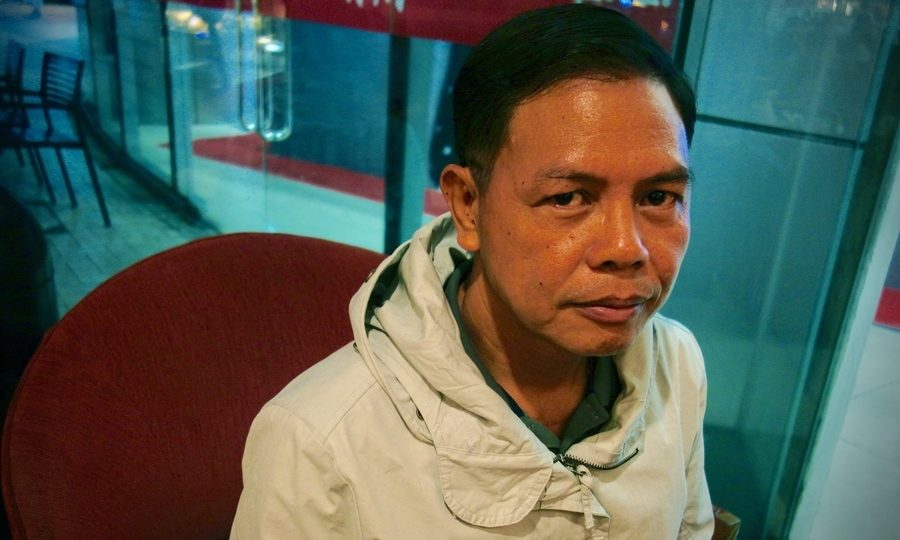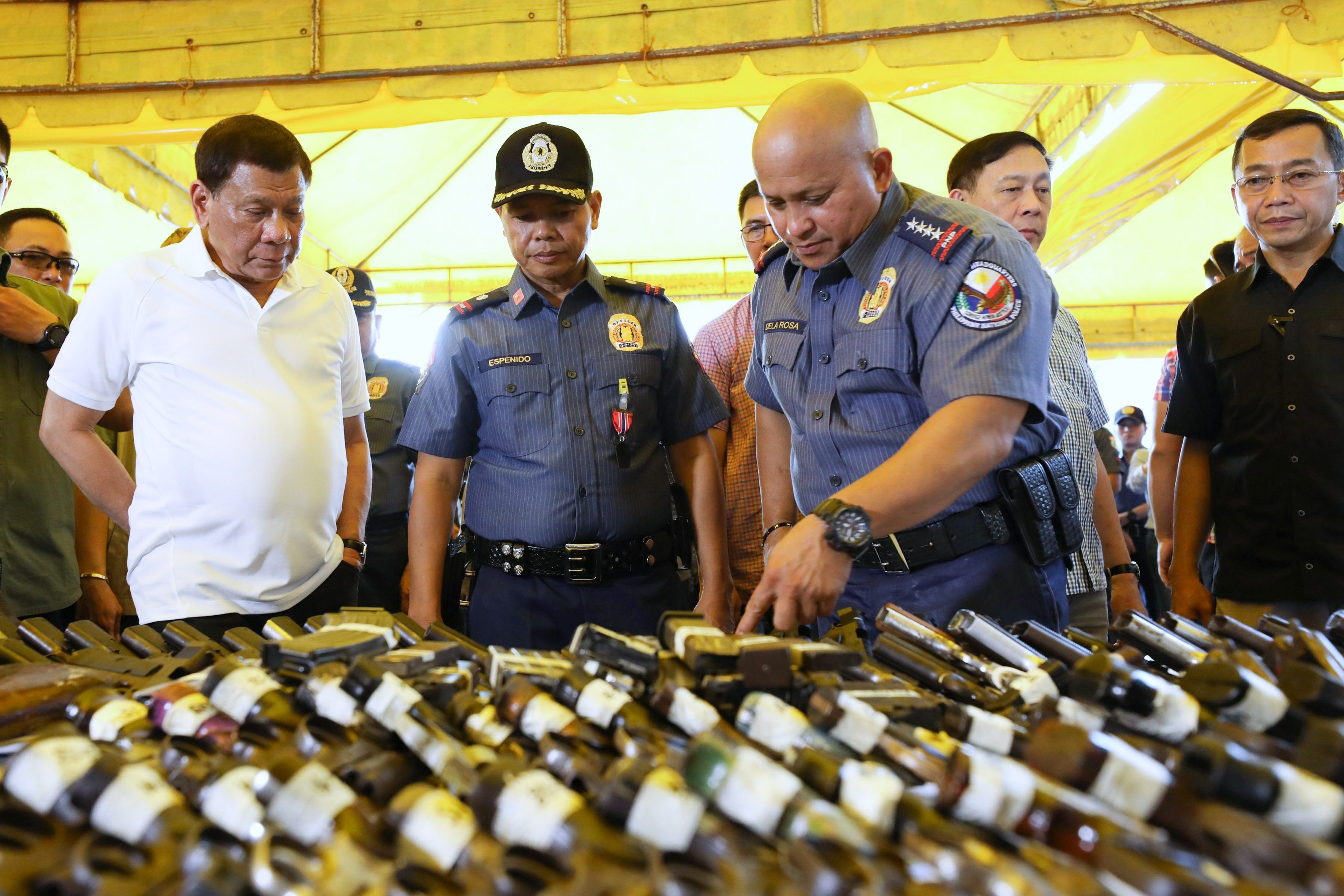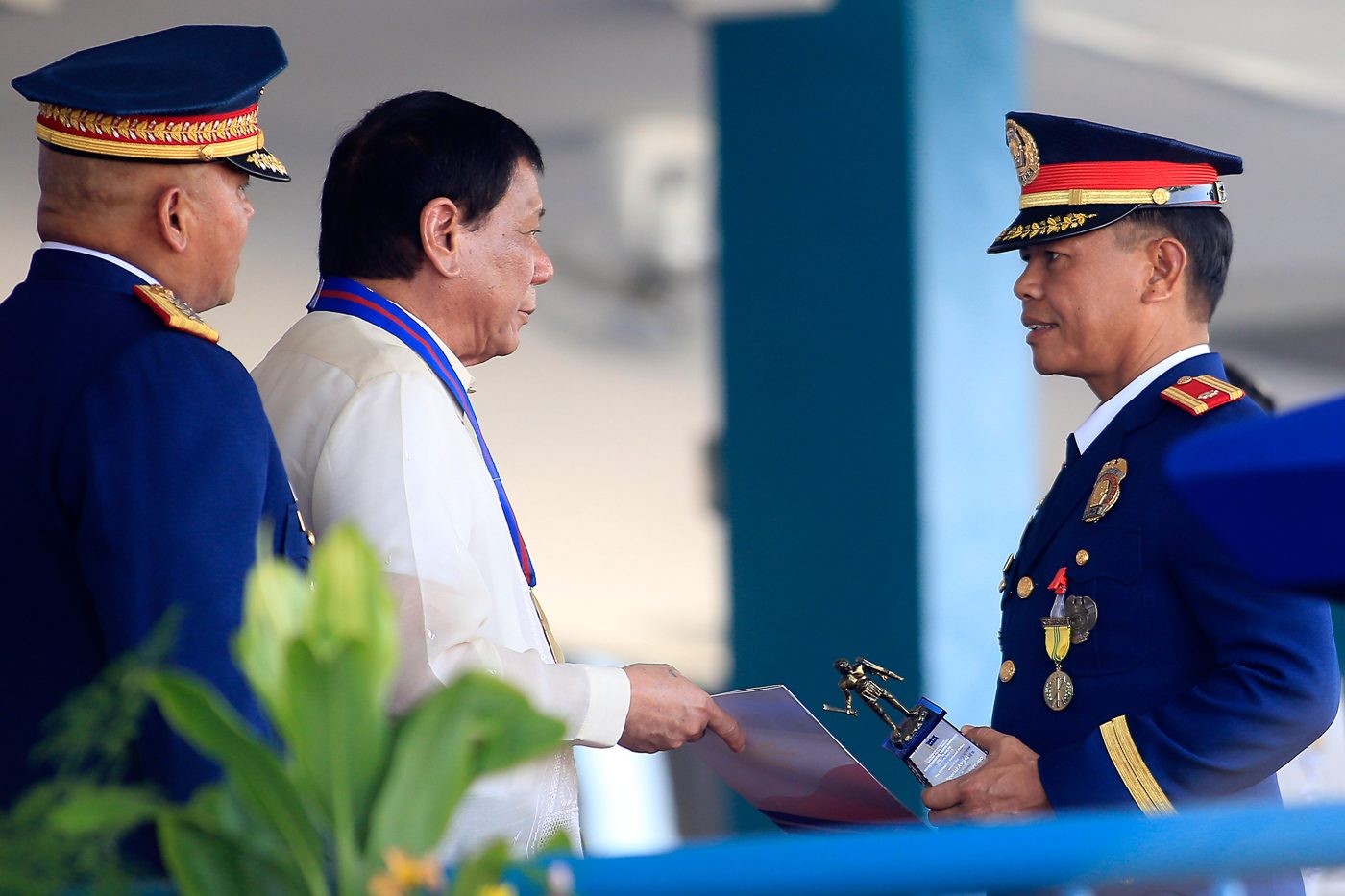SUMMARY
This is AI generated summarization, which may have errors. For context, always refer to the full article.

MANILA, Philippines – Jovie Espenido has been praying for his next assignment for a while now.
His last one in Ozamiz City ended with a mayor and at least a dozen dead on the floor of their home. The encounter has caused officials, from mayors to senators, to worry – at the mere mention of his name.
They deserved it, Espenido said. They fought back. They have killed police, and it’s high time the police had the upperhand.
Espenido sees his job as simply being a battle between good and evil, and he has listed many victories for the good, with his superiors as witness.
Within 3 weeks, he has received two medals from the President who commended him for his contribution to one campaign – the war on drugs.
Without a doubt, Espenido is the administration’s dream drug war soldier.
He met with me in a popular cafe in the country’s largest mall that stands on reclaimed land. He donned a pale brown parka paired with jeans and sneakers and left his padded uniform at Camp Crame. The cop was visibly dressed down, beyond recognition.
Always assigned to the provinces, he had brought his team from Ozamiz City to crawl the concrete of the metro.
“Minsan lang kami nandito sa Maynila, at first time nila sa MOA [Mall of Asia],” Espenido said. (We are seldom in Manila and it’s their first time at MOA.)
Espenido had no operations that night.
Espenido the soldier?
The in-demand cop was born in San Miguel, Surigao, a distant town in the upper right fold of Mindanao.
When he was growing up, San Miguel was a silent town until the New People’s Army started camping near the Surigao seaside, attracting soldiers to patrol the area.
It was around that time under the Cory Aquino administration, Espenido recalled, when he decided to be a soldier.
Defending the country was not on his mind. He wanted to rid the country of its own soldiers who had supposedly gone astray.
He saw camo-clad men beating up his friends for speaking with the wrong tone, and sleeping with the women of his sleepy home town.
“Gusto ko na sa akin na lang na ako ang sundalo babaguhin ko ang sistema ng sundalo,” he said. (I wanted that I myself, as a soldier, would change the system of soldiers.)
Espenido himself was not pummeled by the soldiers as he was the son of Vicente Espenido, the town’s vice mayor then, and Josefina, a barangay captain at the time. He was protected and privileged in his childhood, he admitted.
Before graduating from high school, he was swayed by his brothers to apply with the Philippine Constabulary to get into the army, but before he finished, it got dissolved.
He took a two-year course from 1986 to 1988 to become a mechanic instead, then married in 1990.

Police by crime
Espenido became a cop only in 1996. Little did his colleagues and bosses know, he managed a sari-sari store in Ormoc, Leyte, where he lived with his in-laws.
Espenido just had to follow a cycle, manning the store and restocking their supplies.
They just had enough space for buyers to enter their shop, where dozens of junk food hung on the walls, and soft drinks were cooled in a single refrigerator. For additional income, they sold coco lumber and hollow blocks stacked outside their home.
Espenido could have spent his whole life surrounded by farmland, but his life was once again spoiled by abusive officers. The second time, they were policemen, asking them for money with their threatening guns. By that time too, no more vice mayors or barangay captains could come to his defense.
“‘Yun nga mother-in-law ko iyak siya, bakit ganoon, bakit legal ang kuwan natin, ang tinda, pagkatapos magpunta dito ang pulis, dito naghingi, gusto pa hindi pa P500, P1,000, P1500, P2,000, tapos maraming unit yan,” Espenido recounted.
(My mother-in-law kept crying asking why cops kept extorting from us, asking for P500, P1,000, P1,500, P2,000 from different PNP units.)
They came at least once a month, he said. Every time, he stopped himself from fighting back. He feared for his family.
Espenido snapped during a night in early 1996. Just before they closed shop, armed robbers barged into their store, ordered them to drop, and threatened them to stay on the ground or be shot. All were taken from them that night.
The same year, he entered the Philippine National Police (PNP) through its lateral entry program, vowing to himself and God he would prevent as many robberies as possible.
Some 21 years later, he stood before the President atop the grandstand of the PNP’s national headquarters, receiving an award for lowering all crimes in Ozamiz City, except for murder and homicide.
Faith in action
Espenido is a cop and a devout Seventh-Day Adventist. While there appears to be dissonance between praying and shooting down criminals, to Espenido, it is faith in action.
To him, laws of the land came from God himself.
“God is a god of order kasi, lahat ng mangyari, sa panginoon nakalagay,” he said. (God is a god of order. Everything that happens is up to God.)
And no better way to enforce order than through the agency tasked to enforce it. Espenido quotes Romans 13 in the bible to explain how it relates to him:
“Sabi sa Romans 13, respetuhin niyo ang authority, the authority, Diyos ang nagbigay n’on, Diyos ang nagbigay ng pahintulot n’on, so kami authority,” Espenido said. “Dapat ang mga tao magrespeto sa amin kasi kami ang mandate ng Panginoon na mag-implement ng batas na galing sa 10 commandments.“
(It is said in Romans 13 that we need to respect authority. The Lord gave us the authority, we are the authority. People should respect us because we are mandated by the Lord to implement the law, which comes from the 10 commandments.)
Addressing the 6th commandment in the bible – You shall not kill – he pointed to the exceptions in the PNP manual.
“Number one, the PNP is mandated sa pagpatay kung kinakailangan, lalo na pag depensa sa isang tao na nasa danger. Pangalawa, ang pulis para naman maproteksyunan ang buhay niya, kung nasa danger ang buhay ng pulis,” he said.
(First, the PNP has been mandated to kill especially in self-defense. Second, the police need to protect themselves.)
He invoked “the will of God” each time he was asked what his next assignment would be, as if his transfer was not easily decided upon by PNP chief Dela Rosa or President Duterte himself.
It is not surprising, as Espenido deems Duterte’s presidency as “divine intervention” in action.

Espenido’s prayer
Among all the 5 presidents he has served as a cop, Espenido said nobody comes close to Duterte in understanding drugs and criminality in the country.
“Si Duterte lang ang makikita natin na naging presidente na tinutukan talaga’ yung mga katiwalian, ‘yung totoong katiwalian, at saka tinututukan yung mga drugs na rampant, very rampant sa Pilipinas,” Espenido said.
(Duterte is the only president who has focused on corruption, the real corruption, and illegal drugs, which are very rampant in the Philippines.)
Espenido sees power in Duterte – almost biblical – able to prompt suspects to surrender, just through his words.
He said he would just be a “loyal soldier” in the war against drugs, following the President’s orders as if they came from God himself. Never mind him saying that Jesus Christ would agree with killing criminals.
“Hindi naman natin titingnan ang ugali. Ang ugali natin iba-iba, pero si Presidente yung motive ba, yung motive ba na ginawa niya na para sa karamihan ng tao na inosente na nabiktima ng karumal-dumal na kurapsyon dito sa bayan,” he said.
(We do not look at the attitude, our attitudes change, but the motive, the President is motivated by the desire to protect the innocent majority who have been victimized by disgusting corruption in the country.)
He said he was thankful that Duterte heard his prayer to be assigned to Iloilo City, but admitted he wanted more: to become the chief of the Philippine National Police.
This was after he was asked whether drugs and criminality can indeed be quelled by 2022. He said it is still possible to end them within Duterte’s term, or even before the President steps down, if only he were given the chance.
“Open ako sa chief PNP, gusto ko. Ipapakita ko sa lahat ng tao na kaya ng pulis na malinis [sa] isang iglap lang, isang pitik lang, ang problema,” Espenido said. (I am open to becoming the chief PNP, I want it. I will show to all people that the police can clean up the country in one snap.)
“Sa akin lang, pagbigyan lang ako ng pagkakataon na tumulong, na maglead. Malayo na ang two years sa akin, malayo lang ang two years sa akin. Lahat ng illegal, I tell you,” he said.
(For me, if you give me a chance to help, to lead, two years is already too long. All the illegal, I tell you.)
Espenido knows he has many more operations ahead of him before more of his wishes are heard, but that night, all he wished for was to sightsee with his men. – Rappler.com
Add a comment
How does this make you feel?





There are no comments yet. Add your comment to start the conversation.